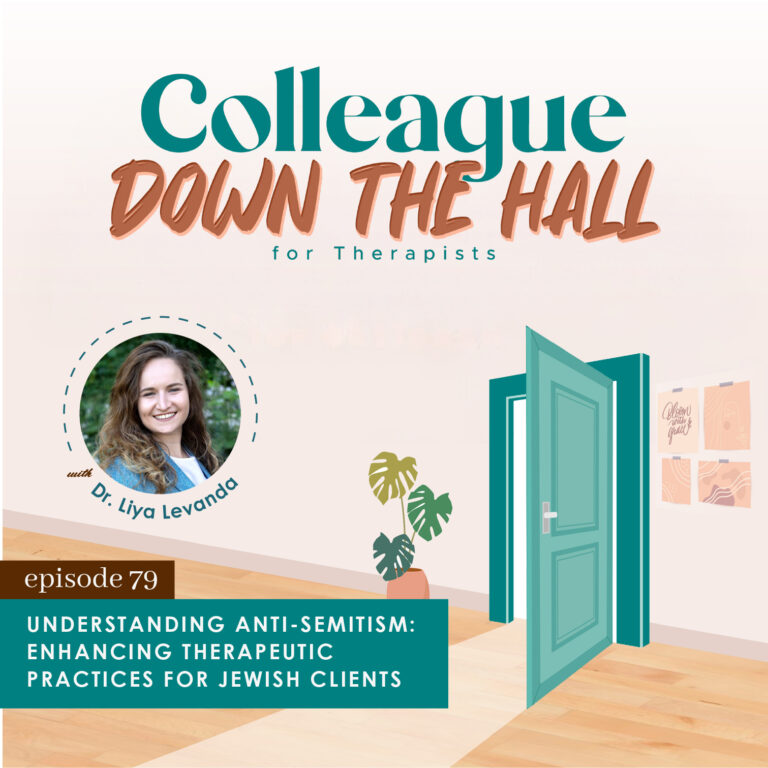CollabOasis Clinical Consultation Groups
New Groups Forming Now!
79. Understanding Anti-Semitism: Enhancing Therapeutic Practices for Jewish Clients with Dr. Liya Levanda
79. Understanding Anti-Semitism: Enhancing Therapeutic Practices for Jewish Clients with Dr. Liya Levanda

In today’s episode of the Colleague Do wn the Hall Podcast, Jeanene Wolfe interviews Dr. Liya Levanda, a specialist in Jewish clinical issues and the impact of anti-Semitism on mental health. They discuss the IHRA and Jerusalem Declaration definitions of anti-Semitism, emphasizing the need for therapists to understand these frameworks to better support Jewish clients. Dr. Levanda addresses stereotypes in media and clinical settings, such as misconceptions about Jewish wealth or identity, and the importance of not making assumptions about clients’ racial or cultural backgrounds. They delve into Jewish identity’s complexity, including religious and cultural aspects, and the significance of matrilineal descent. The episode also covers the challenges faced by Jewish therapists, strategies to prevent burnout, and resources for further learning. Dr. Levanda underscores that understanding and supporting Jewish clients contributes to broader diversity, equity, and inclusion efforts in mental health.
“I, being Jewish, have had the privilege of having my whole life to have learned about this, and it does take a while, and even still, it feels like there’s just always more and more to learn. And a lot of people will ask me, I want to support Palestinians, and I also want to support Jewish clients,how do I do that? And my answer for them is that you don’t have to pick. I think a lot of mental health professionals feel like they have to choose one or the other, and that their practice can only be available to Palestinians and Muslims or only available to Jews and Israelis. And my answer is that that doesn’t have to be the case. I think we have such a unique role as mental health professionals, in not only our jobs to help and to mitigate harm, but also in our ability to connect with this sense of common humanity, we can identify you know, each person here has a story and has a perspective, and sometimes perspectives conflict.”- Liya Levanda
In this episode, let’s delve into:
***Understanding Anti-Semitism Definitions: Dr. Levanda explains the IHRA and Jerusalem Declaration definitions of anti-Semitism, stressing the need for therapists to be familiar with these frameworks to accurately recognize and address anti-Semitic beliefs and behaviors in clinical settings.
***Challenging Stereotypes and Misconceptions: The episode highlights the prevalence of stereotypes, such as the notion that Jews control financial institutions or media.
***Complexity of Jewish Identity: Therapists should ask clients how they identify, without making assumptions about their racial or cultural background, to provide more personalized and respectful care.
***Creating Safe Therapeutic Spaces: Therapists should foster environments where Jewish clients feel safe discussing their identity and experiences.
***Support for Jewish Therapists: The conversation addresses the unique challenges faced by Jewish therapists, especially in the context of increased anti-Semitic incidents.
***Ongoing Education and Advocacy: Mental health professionals are encouraged to continue their education on Jewish issues and anti-Semitism, utilizing resources such as Dr. Levanda’s website and organizations like the Association of Jewish Psychologists. Increased knowledge can help create a more inclusive and supportive therapeutic environment for Jewish clients.
About Dr. Liya Levanda:
Liya Levanda, PsyD, is a licensed clinical psychologist. She provides training and workshops on Jewish clinical issues, including antisemitism, as they pertain to mental health professionals. Over the past decade, she has passionately advocated against antisemitism, with appearances ranging from local universities’ Jewish student union chapters to national organizations, regional psychological associations, and even podcasts. Dr. Levanda actively seeks to empower individuals with the knowledge and tools necessary to challenge antisemitic beliefs and provide clinicians with relevant tools to improve their practice, grounded in the belief that there is no such thing as a “dumb” question.
Connect with Dr. Liya:
Website: https://www.drlevanda.com/
